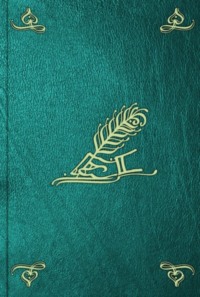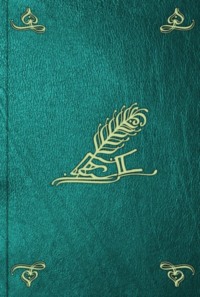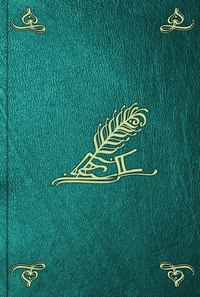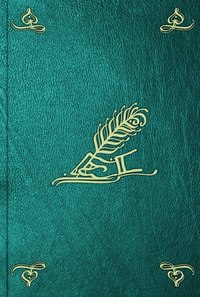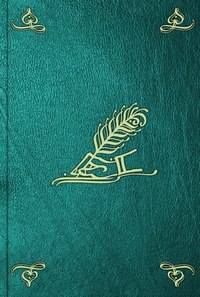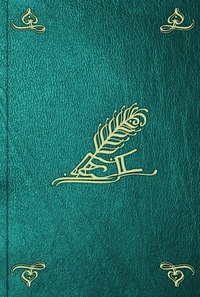 полная версия
полная версияMore Letters of Charles Darwin — Volume 1
LETTER 226. TO AUGUST WEISMANN. Down, October 22nd, 1868.
I am very much obliged for your kind letter, and I have waited for a week before answering it in hopes of receiving the "kleine Schrift" (226/1. The "kleine Schrift" is "Ueber die Berechtigung der Darwin'schen Theorie," Leipzig, 1868. The "Anhang" is "Ueber den Einfluss der Wanderung und raumlichen Isolirung auf die Artbilding.") to which you allude; but I fear it is lost, which I am much surprised at, as I have seldom failed to receive anything sent by the post.
As I do not know the title, and cannot order a copy, I should be very much obliged if you can spare another.
I am delighted that you, with whose name I am familiar, should approve of my work. I entirely agree with what you say about each species varying according to its own peculiar laws; but at the same time it must, I think, be admitted that the variations of most species have in the lapse of ages been extremely diversified, for I do not see how it can be otherwise explained that so many forms have acquired analogous structures for the same general object, independently of descent. I am very glad to hear that you have been arguing against Nageli's law of perfectibility, which seems to me superfluous. Others hold similar views, but none of them define what this "perfection" is which cannot be gradually attained through Natural Selection. I thought M. Wagner's first pamphlet (226/2. Wagner's first essay, "Die Darwin'sche Theorie und das Migrationsgesetz," 1868, is a separately published pamphlet of 62 pages. In the preface the author states that it is a fuller version of a paper read before the Royal Academy of Science at Munich in March 1868. We are not able to say which of Wagner's writings is referred to as the second pamphlet; his second well-known essay, "Ueber den Einfluss der Geogr. Isolirung," etc., is of later date, viz., 1870.) (for I have not yet had time to read the second) very good and interesting; but I think that he greatly overrates the necessity for emigration and isolation. I doubt whether he has reflected on what must occur when his forms colonise a new country, unless they vary during the very first generation; nor does he attach, I think, sufficient weight to the cases of what I have called unconscious selection by man: in these cases races are modified by the preservation of the best and the destruction of the worst, without any isolation.
I sympathise with you most sincerely on the state of your eyesight: it is indeed the most fearful evil which can happen to any one who, like yourself, is earnestly attached to the pursuit of natural knowledge.
LETTER 227. TO F. MULLER. Down, March 18th {1869}.
Since I wrote a few days ago and sent off three copies of your book, I have read the English translation (227/1. "Facts and Arguments for Darwin." See "Life and Letters," III., page 37.), and cannot deny myself the pleasure of once again expressing to you my warm admiration. I might, but will not, repeat my thanks for the very honourable manner in which you often mention my name; but I can truly say that I look at the publication of your essay as one of the greatest honours ever conferred on me. Nothing can be more profound and striking than your observations on development and classification. I am very glad that you have added your justification in regard to the metamorphoses of insects; for your conclusion now seems in the highest degree probable. (227/2. See "Facts and Arguments for Darwin," page 119 (note), where F. Muller gives his reasons for the belief that the "complete metamorphosis" of insects was not a character of the form from which insects have sprung: his argument largely depends on considerations drawn from the study of the neuroptera.) I have re-read many parts, especially that on cirripedes, with the liveliest interest. I had almost forgotten your discussion on the retrograde development of the Rhizocephala. What an admirable illustration it affords of my whole doctrine! A man must indeed be a bigot in favour of separate acts of creation if he is not staggered after reading your essay; but I fear that it is too deep for English readers, except for a select few.
LETTER 228. TO A.R. WALLACE. March 27th {1869}.
I have lately (i.e., in new edition of the "Origin") (228/1. Fifth edition, 1869, pages 150-57.) been moderating my zeal, and attributing much more to mere useless variability. I did think I would send you the sheet, but I daresay you would not care to see it, in which I discuss Nageli's Essay on Natural Selection not affecting characters of no functional importance, and which yet are of high classificatory importance. Hooker is pretty well satisfied with what I have said on this head.
LETTER 229. TO J.D. HOOKER. Caerdeon, Barmouth, North Wales, July 24th {1869}.
We shall be at home this day week, taking two days on the journey, and right glad I shall be. The whole has been a failure to me, but much enjoyment to the young...My wife has ailed a good deal nearly all the time; so that I loathe the place, with all its beauty. I was glad to hear what you thought of F. Muller, and I agree wholly with you. Your letter came at the nick of time, for I was writing on the very day to Muller, and I passed on your approbation of Chaps. X. and XI. Some time I should like to borrow the "Transactions of the New Zealand Institute," so as to read Colenso's article. (229/1. Colenso, "On the Maori Races of New Zealand." "N.Z. Inst. Trans." 1868, Pt. 3.) You must read Huxley v. Comte (229/2. "The Scientific Aspects of Positivism." "Fortnightly Review," 1869, page 652, and "Lay Sermons," 1870, page 162. This was a reply to Mr. Congreve's article, "Mr. Huxley on M. Comte," published in the April number of the "Fortnightly," page 407, which had been written in criticism of Huxley's article in the February number of the "Fortnightly," page 128, "On the Physical Basis of Life."); he never wrote anything so clever before, and has smashed everybody right and left in grand style. I had a vague wish to read Comte, and so had George, but he has entirely cured us of any such vain wish.
There is another article (229/3. "North British Review," Volume 50, 1869: "Geological Time," page 406. The papers reviewed are Sir William Thomson, "Trans. R. Soc. Edin." 1862; "Phil. Mag." 1863; Thomson and Tait, "Natural Philosophy," Volume I., App. D; Sir W. Thomson, "Proc. R. Soc. Edin." 1865; "Trans. Geol. Soc. Glasgow," 1868 and 1869; "Macmillan's Mag." 1862; Prof. Huxley, Presidential Address, "Geol. Soc. London," February, 1869; Dr. Hooker, Presidential Address, "Brit. Assoc." Norwich, 1868. Also the review on the "Origin" in the "North British Review," 1867, by Fleeming Jenkin, and an article in the "Pall Mall Gazette," May 3rd, 1869. The author treats the last-named with contempt as the work of an anonymous journalist, apparently unconscious of his own similar position.) just come out in last "North British," by some great mathematician, which is admirably done; he has a severe fling at you (229/4. The author of the "North British" article appears to us, at page 408, to misunderstand or misinterpret Sir J.D. Hooker's parable on "underpinning." See "Life and Letters," III., page 101 (note). Sir Joseph is attacked with quite unnecessary vehemence on another point at page 413.), but the article is directed against Huxley and for Thomson. This review shows me — not that I required being shown — how devilish a clever fellow Huxley is, for the reviewer cannot help admiring his abilities. There are some good specimens of mathematical arrogance in the review, and incidentally he shows how often astronomers have arrived at conclusions which are now seen to be mistaken; so that geologists might truly answer that we must be slow in admitting your conclusions. Nevertheless, all uniformitarians had better at once cry "peccavi," — not but what I feel a conviction that the world will be found rather older than Thomson makes it, and far older than the reviewer makes it. I am glad I have faced and admitted the difficulty in the last edition of the "Origin," of which I suppose you received, according to order, a copy.
LETTER 230. TO J.D. HOOKER. Down, August 7th {1869}.
There never was such a good man as you for telling me things which I like to hear. I am not at all surprised that Hallett has found some varieties of wheat could not be improved in certain desirable qualities as quickly as at first. All experience shows this with animals; but it would, I think, be rash to assume, judging from actual experience, that a little more improvement could not be got in the course of a century, and theoretically very improbable that after a few thousands {of years} rest there would not be a start in the same line of variation. What astonishes me as against experience, and what I cannot believe, is that varieties already improved or modified do not vary in other respects. I think he must have generalised from two or three spontaneously fixed varieties. Even in seedlings from the same capsule some vary much more than others; so it is with sub-varieties and varieties. (230/1. In a letter of August 13th, 1869, Sir J.D. Hooker wrote correcting Mr. Darwin's impression: "I did not mean to imply that Hallett affirmed that all variation stopped — far from it: he maintained the contrary, but if I understand him aright, he soon arrives at a point beyond which any further accumulation in the direction sought is so small and so slow that practically a fixity of type (not absolute fixity, however) is the result.")
It is a grand fact about Anoplotherium (230/2. This perhaps refers to the existence of Anoplotherium in the S. American Eocene formation: it is one of the points in which the fauna of S. America resembles Europe rather than N. America. (See Wallace "Geographical Distribution," I., page 148.)), and shows how even terrestrial quadrupeds had time formerly to spread to very distinct regions. At each epoch the world tends to get peopled pretty uniformly, which is a blessing for Geology.
The article in "N. British Review" (230/3. See Letter 229.) is well worth reading scientifically; George D. and Erasmus were delighted with it. How the author does hit! It was a euphuism to speak of a fling at you: it was a kick. He is very unfair to Huxley, and accuses him of "quibbling," etc.; yet the author cannot help admiring him extremely. I know I felt very small when I finished the article. You will be amused to observe that geologists have all been misled by Playfair, who was misled by two of the greatest mathematicians! And there are other such cases; so we could turn round and show your reviewer how cautious geologists ought to be in trusting mathematicians.
There is another excellent original article, I feel sure by McClennan, on Primeval Man, well worth reading.
I do not quite agree about Sabine: he is unlike every other soldier or sailor I ever heard of if he would not put his second leg into the tomb with more satisfaction as K.C.B. than as a simple man. I quite agree that the Government ought to have made him long ago, but what does the Government know or care for Science? So much for your splenditious letter.
LETTER 231. TO J.D. HOOKER. Down, August 14th {1869?}
I write one line to tell you that you are a real good man to propose coming here for a Sunday after Exeter. Do keep to this good intention...I am sure Exeter and your other visit will do you good. I often wonder how you stand all your multifarious work.
I quite agree about the folly of the endless subscriptions for dead men; but Faraday is an exception, and if you will pay three guineas for me, it will save me some trouble; but it will be best to enclose a cheque, which, as you will see, must be endorsed. If you read the "North British Review," you will like to know that George has convinced me, from correspondence in style, and spirit, that the article is by Tait, the co-worker with Thomson.
I was much surprised at the leaves of Drosophyllum being always rolled backwards at their tips, but did not know that it was a unique character.
(PLATE: SIR J.D. HOOKER, 1870? From a photograph by Wallich.)
LETTER 232. TO J.D. HOOKER. Down, November 13th {1869}.
I heard yesterday from a relation who had seen in a newspaper that you were C.B. I must write one line to say "Hurrah," though I wish it had been K.C.B., as it assuredly ought to have been; but I suppose they look at K.C.B. before C.B. as a dukedom before an earldom.
We had a very successful week in London, and I was unusually well and saw a good many persons, which, when well, is a great pleasure to me. I had a jolly talk with Huxley, amongst others. And now I am at the same work as before, and shall be for another two months — namely, putting ugly sentences rather straighter; and I am sick of the work, and, as the subject is all on sexual selection, I am weary of everlasting males and females, cocks and hens.
It is a shame to bother you, but I should like some time to hear about the C.B. affair.
I have read one or two interesting brochures lately — viz., Stirling the Hegelian versus Huxley and protoplasm; Tylor in "Journal of Royal Institute" on the survivals of old thought in modern civilisation.
Farewell. I am as dull as a duck, both male and female.
To Dr. Hooker, C.B., F.R.S.
Dr. Hooker, K.C.B. (This looks better).
P.S. I hear a good account of Bentham's last address (232/1. Presidential Address, chiefly on Geographical Distribution, delivered before the "Linn. Soc." May 24th, 1869.), which I am now going to read.
I find that I have blundered about Bentham's address. Lyell was speaking about one that I read some months ago; but I read half of it again last night, and shall finish it. Some passages are either new or were not studied enough by me before. It strikes me as admirable, as it did on the first reading, though I differ in some few points.
Such an address is worth its weight in gold, I should think, in making converts to our views. Lyell tells me that Bunbury has been wonderfully impressed with it, and he never before thought anything of our views on evolution.
P.S. (2). I have just read, and like very much, your review of Schimper. (232/2. A review of Schimper's "Traite de Paleontologie Vegetale," the first portion of which was published in 1869. "Nature," November 11th, 1869, page 48.)
LETTER 233. TO J.D. HOOKER. Down, November 19th {1869}.
Thank you much for telling me all about the C.B., for I much wished to hear. It pleases me extremely that the Government have done this much; and as the K.C.B.'s are limited in number (which I did not know), I excuse it. I will not mention what you have told me to any one, as it would be Murchisonian. But what a shame it is to use this expression, for I fully believe that Murchison would take any trouble to get any token of honour for any man of science.
I like all scientific periodicals, including poor "Scientific Opinion," and I think higher than you do of "Nature." Lord, what a rhapsody that was of Goethe, but how well translated; it seemed to me, as I told Huxley, as if written by the maddest English scholar. It is poetry, and can I say anything more severe? The last number of the "Academy" was splendid, and I hope it will soon come out fortnightly. I wish "Nature" would search more carefully all foreign journals and transactions.
I am now reading a German thick pamphlet (233/1. "Die Abhangigheit der Pflanzengestalt von Klima und Boden. Ein Beitrag zur Lehre von der Enstehung und Verbreitung der Arten, etc." Festschrift zur 43 Versammlung Deutscher Naturforscher und Aertze in Innsbruck (Innsbruck, 1869).) by Kerner on Tubocytisus; if you come across it, look at the map of the distribution of the eighteen quasi-species, and at the genealogical tree. If the latter, as the author says, was constructed solely from the affinities of the forms, then the distribution is wonderfully interesting; we may see the very steps of the formation of a species. If you study the genealogical tree and map, you will almost understand the book. The two old parent connecting links just keep alive in two or three areas; then we have four widely extended species, their descendants; and from them little groups of newer descendants inhabiting rather small areas...
LETTER 234. TO CAMILLE DARESTE. Down, November 20th, 1869.
Dear Sir,
I am glad that you are a candidate for the Chair of Physiology in Paris. As you are aware from my published works, I have always considered your investigations on the production of monstrosities as full of interest. No subject is at the present time more important, as far as my judgment goes, than the ascertaining by experiment how far structure can be modified by the direct action of changed conditions; and you have thrown much light on this subject.
I observe that several naturalists in various parts of Europe have lately maintained that it is now of the highest interest for science to endeavour to lessen, as far as possible, our profound ignorance on the cause of each individual variation; and, as Is. Geoffroy St. Hilaire long ago remarked, monstrosities cannot be separated by any distinct line from slighter variations.
With my best wishes for your success in obtaining the Professorship, and with sincere respect.
I have the honour to remain, dear sir, Yours faithfully, CHARLES DARWIN.
CHAPTER 1.V. — EVOLUTION, 1870-1882
LETTER 235. TO J. JENNER WEIR. Down, March 17th {1870}.
It is my decided opinion that you ought to send an account to some scientific society, and I think to the Royal Society. (235/1. Mr. Jenner Weir's case is given in "Animals and Plants," Edition II., Volume I., page 435, and does not appear to have been published elsewhere. The facts are briefly that a horse, the offspring of a mare of Lord Mostyn's, which had previously borne a foal by a quagga, showed a number of quagga-like characters, such as stripes, low-growing mane, and elongated hoofs. The passage in "Animals and Plants," to which he directs Mr. Weir's attention in reference to Carpenter's objection, is in Edition I., Volume I., page 405: "It is a most improbable hypothesis that the mere blood of one individual should affect the reproductive organs of another individual in such a manner as to modify the subsequent offspring. The analogy from the direct action of foreign pollen on the ovarium and seed-coats of the mother plant strongly supports the belief that the male element acts directly on the reproductive organs of the female, wonderful as is this action, and not through the intervention of the crossed embryo." For references to Mr. Galton's experiments on transfusion of blood, see Letter 273.) I would communicate it if you so decide. You might give as a preliminary reason the publication in the "Transactions" of the celebrated Morton case and the pig case by Mr. Giles. You might also allude to the evident physiological importance of such facts as bearing on the theory of generation. Whether it would be prudent to allude to despised pangenesis I cannot say, but I fully believe pangenesis will have its successful day. Pray ascertain carefully the colour of the dam and sire. See about duns in my book {"Animals and Plants"}, Volume I., page 55. The extension of the mane and form of hoofs are grand new facts. Is the hair of your horse at all curly? for {an} observed case {is} given by me (Volume II., page 325) from Azara of correlation of forms of hoof with curly hairs. See also in my book (Volume I., page 55; Volume II., page 41) how exceedingly rare stripes are on the faces of horses in England. Give the age of your horse.
You are aware that Dr. Carpenter and others have tried to account for the effects of a first impregnation from the influence of the blood of the crossed embryo; but with physiologists who believe that the reproductive elements are actually formed by the reproductive glands, this view is inconsistent. Pray look at what I have said in "Domestic Animals" (Volume I., pages 402-5) against this doctrine. It seems to me more probable that the gemmules affect the ovaria alone. I remember formerly speculating, like you, on the assertion that wives grow like their husbands; but how impossible to eliminate effects of imitation and same habits of life, etc. Your letter has interested me profoundly.
P.S. — Since publishing I have heard of additional cases — a very good one in regard to Westphalian pigs crossed by English boar, and all subsequent offspring affected, given in "Illust. Landwirth-Zeitung," 1868, page 143.
I have shown that mules are often striped, though neither parent may be striped, — due to ancient reversion. Now, Fritz Muller writes to me from S. Brazil: "I have been assured, by persons who certainly never had heard of Lord Morton's mare, that mares which have borne hybrids to an ass are particularly liable to produce afterwards striped ass-colts." So a previous fertilisation apparently gives to the subsequent offspring a tendency to certain characters, as well as characters actually possessed by the first male.
In the reprint (not called a second edition) of my "Domestic Animals" I give a good additional case of subsequent progeny of hairless dog being hairy from effects of first impregnation.
P.S. 2nd. The suggestion, no doubt, is superfluous, but you ought, I think, to measure extension of mane beyond a line joining front or back of ears, and compare with horse. Also the measure (and give comparison with horse), length, breadth, and depth of hoofs.
LETTER 236. TO J.D. HOOKER. Down, July 12th {1870}.
Your conclusion that all speculation about preordination is idle waste of time is the only wise one; but how difficult it is not to speculate! My theology is a simple muddle; I cannot look at the universe as the result of blind chance, yet I can see no evidence of beneficent design or indeed of design of any kind, in the details. As for each variation that has ever occurred having been preordained for a special end, I can no more believe in it than that the spot on which each drop of rain falls has been specially ordained.
Spontaneous generation seems almost as great a puzzle as preordination. I cannot persuade myself that such a multiplicity of organisms can have been produced, like crystals, in Bastian's (236/1. On September 2nd, 1872, Mr. Darwin wrote to Mr. Wallace, in reference to the latter's review of "The Beginnings of Life," by H.C. Bastian (1872), in "Nature," 1872, pages 284-99: "At present I should prefer any mad hypothesis, such as that every disintegrated molecule of the lowest forms can reproduce the parent-form; and that these molecules are universally distributed, and that they do not lose their vital power until heated to such a temperature that they decompose like dead organic particles.") solutions of the same kind. I am astonished that, as yet, I have met with no allusion to Wyman's positive statement (236/2. "Observations and Experiments on Living Organisms in Heated Water," by Jeffries Wyman, Prof. of Anatomy, Harvard Coll. ("Amer. Journ. Sci." XLIV., 1867, page 152.) Solutions of organic matter in hermetically sealed flasks were immersed in boiling water for various periods. "No infusoria of any kind appeared if the boiling was prolonged beyond a period of five hours.") that if the solutions are boiled for five hours no organisms appear; yet, if my memory serves me, the solutions when opened to air immediately became stocked. Against all evidence, I cannot avoid suspecting that organic particles (my "gemmules" from the separate cells of the lower creatures!) will keep alive and afterwards multiply under proper conditions.
What an interesting problem it is.
LETTER 237. TO W.B. TEGETMEIER. Down, July 15th {1870}.
It is very long since I have heard from you, and I am much obliged for your letter. It is good news that you are going to bring out a new edition of your Poultry book (237/1. "The Poultry Book," 1872.), and you are quite at liberty to use all my materials. Thanks for the curious case of the wild duck variation: I have heard of other instances of a tendency to vary in one out of a large litter or family. I have too many things in hand at present to profit by your offer of the loan of the American Poultry book.



